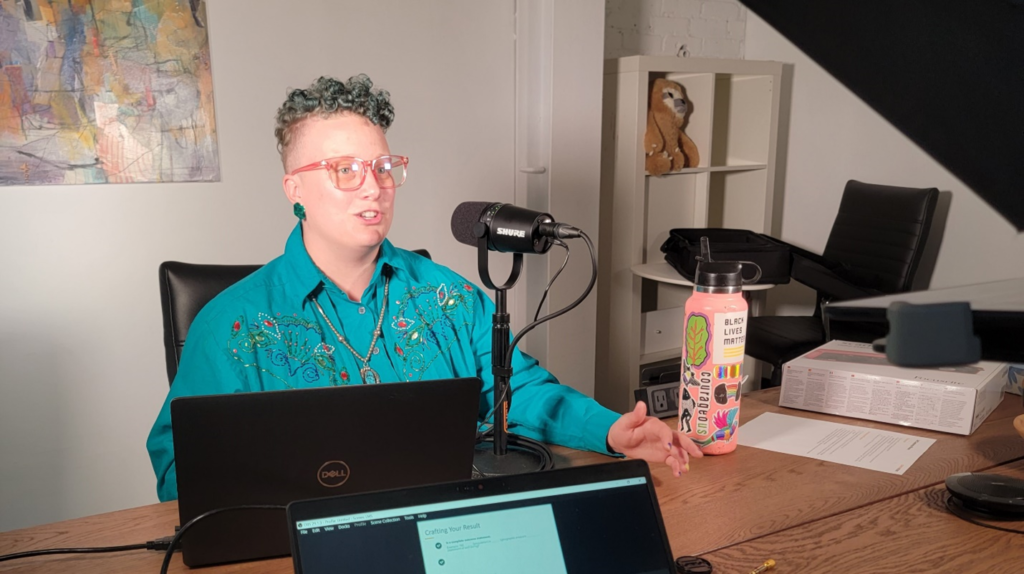It has been a year since we launched Canopy Learning Online (CLO), our online learning platform. We have been hard at work, having published seven workshops on the topics of Sustaining Commitment with Community Partners, Strengthening Decision-Making, and Systems Change. We also produced two live training sessions, countless free toolkits, and continued working to expand our partner offerings. Setting up an on-demand platform can be incredibly beneficial for small teams like us who could benefit from the extra capacity of redirecting folks to online resources as part of our services.
At the Canopy hold learning at the center of what we do—it’s a core component of our Community Learning Model, after all. And we continuously encourage our partners to engage in reflections that allow for discovery, creativity, and growth. Having been the lead for CLO over the past year and a half, below are some of the lessons and learnings gained over the past year I’m motivated to share with you with the hope they prove helpful in your own personal and professional journeys:
Have an ideal scenario, then let it go.
I remember how excited, and ambitious, I was when we were setting out our plans for the first year of CLO workshops and offerings. We had it all figured out: we would release pre-recorded workshops once a month and compliment them with a few live trainings throughout the year. Oh, and don’t forget the one-on-one coaching we would also offer on-demand, the bundles, the high-quality website, the simultaneous interpretation for workshops, so on and so forth. It was an amazing plan; CLO would become a platform to rival any other right from the get-go.
Then we started production. Oh boy did we shoot for the moon. A year in, we have set up a basic CLO registration website, published seven out of the twelve workshops, conducted two live trainings, and postponed the launch of one-on-one on-demand coaching. And that’s okay. We have adjusted our timelines time and time again but, that doesn’t mean we have not made any progress. I encourage everyone to start out with an ideal scenario of what could be, but also be mindful and graceful of what it will take to get there and what is okay to let go off or pick up later.
While the goal is to increase capacity, the way to get there—takes capacity.
A big reason behind our work on CLO is to increase capacity both for our partners and for ourselves. It’s the perfect arrangement: with on-demand resources, our partners would be able to access support on their own timeline, and we would get some of that time back from being able to direct partners to evergreen content.
What we did not account for, however, is that those resources have to come from somewhere. Just because the Canopy has expertise in the resources it provides, doesn’t mean that those resources (almost entirely developed for in-person, live audiences) can be picked up and dropped off for on-demand, virtual delivery. Our team spends an average of ten hours adapting content per workshop, which includes updating our slide graphics, making sure all non-Canopy tools are properly referenced, drafting and revising scripts, and compiling the accompanying resources. Once prep and scriptwriting are complete, we then move to set up our filming sessions. These take place over an average of three hours and include three Canopy staff members: usually me behind the camera, the colleague who developed the workshop in front of the camera, and a colleague to support our filming.
With the workshop filmed, we move on to postproduction. We are fortunate to be able to contract with a video editor who takes care of putting each workshop into cohesive pieces to be uploaded to CLO. This wasn’t always the case, though, as the first few workshops were edited in-house and took another few hours to process.
Lastly, we upload the workshop to CLO. This includes making sure we process everything appropriately through our hosting platform, assign pricing plans accordingly, and build our sales page to showcase the value offered. We are then ready to hit ‘publish’.
Throughout this process, it has been important for us to remind ourselves that it takes capacity to build capacity. We have been able to give ourselves some grace with our timelines, as seen in the point above, but it would be incorrect to not recognize the process needs time and patience.
Collaboration is key to maintaining our quality of work.
CLO can be a heavy lift for any single person to take on by themselves. Thus, we’ve needed to come up with systems and structures to support ease that pressure and share it across our team. We are intentional when deciding who will lead workshop development each time around, basing the decision on our colleague’s expertise, capacity, and interest. We also strive to pair our workshop leads with a support person who revises all their drafts and provides feedback on all things related to the content and resources being offered.
We’ve also begun to collaborate with external partners to support CLO. This includes our video editor, and our Canopy Associates, who step in to develop workshops on topics they are experts on. I am sure CLO would not be where it is today, and won’t grow further, without good collaborative practices.
I’m excited to see where CLO will go next and hope you will join us for the ride! Let me know what topics you’d like to see covered next.


